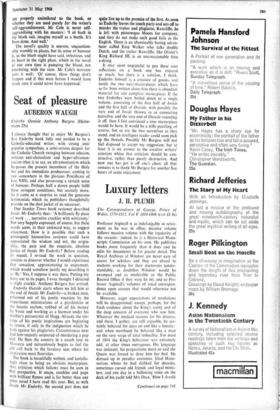Seat of pleasure
AUBERON WAUGH
Enderby Outside Anthony Burgess (Heine- mann 25s)
I always thought that to enjoy Mr Burgess's first Enderby book fully one needed to be a Catholic-educated writer, with strong anti- populist sympathies, a semi-serious despair for the Catholic Church swinging between atheism, militant anti-clericalism and hyper-ultramon- tanism (that is to say, an ultramontanism which by-passes the present incumbent of the Holy See and his immediate predecessor, coming to rent somewhere in the glorious Pontificate of Leo XIII), and also possessing a certain sense of humour. Perhaps half a dozen people fulfil these stringent conditions, but scarcely more. So it came as a surprise to read the generous testimonials which its publishers thoughtfully provide on the dust jacket of its successor.
One Sunday Times book reviewer described Inside Mr Enderby thus: 'A brilliantly fly piece of work .. . narrative crackles with witticisms.' Not very happily expressed, of course, but these words seem, in their awkward way, to suggest enjoyment. How is it possible that such a grotesquely humourless reviewer could have appreciated the wisdom and wit, the origin- ality, the pain and the exquisite, absolute justice of Inside Mr Enderby? Before reading its sequel, I re-read the work in question, anxious to discover whether I would experience that sensation, approximating to enjoyment, which would somehow justify my describing it a 'fly.' Yes, I suppose it was there. Putting. my hairy ear to its pages, I even thought I detected a slight crackle. Anthony Burgess has arrived.
Enderby Outside starts where we left him at the end of Inside Mr Enderby—a broken man, reformed out of his poetic vocation by the impertinent ministrations of a psychiatrist at the lunatic asylum, robbed of all his money by Vesta and working as a barman under his mother's patronymic of Hogg. Already the stir- rings of his poetic inspirations are beginning to return, if only in the indignation which he feels against his plagiarists. Circumstances next find him unjustly suspected of murdering a pop idol. He flees the country in a coach tour to Morocco and miraculously begins to feel the old call back to the lavatory seat where his inspiration most flourishes.
The book is beautifully written, and tantalis- ingly close to being an obvious masterpiece. Any criticism which follows must be seen in that perspective. It snaps, crackles and pops with brilliant flyness and is far better than any other novel I have read this year. But, as with Inside Mr Enderby, the second part does not
quite live up to the promise of the first. As soon as Enderby leaves the coach party and sets off to murder the traitor and plagiarist, Rawcliffe, he is left with picturesque Moors for company, and they do not make such good foils as the English. There is an abominably boring adven- turer called Easy Walker who talks double Dutch, and the traitor Rawcliffe, like Olivier's King Richard III, is an unconscionable time a-dying.
It may seem ungrateful to pen these sour reflections on a book one has enjoyed so much; but there is a solution, I think. Enderby himself is a creature of genius, and inside the two near-masterpieces which have so far been written about him there is abundant material for one complete masterpiece. If the two Enderbys were boiled down to a single volume, consisting of the first half of Inside and the first half of Outside, with possibly the very end of Inside thrown in as connecting narrative, and the very end of Outside rounding it off, then I feel convinced a true masterpiece would be born. It would be a trifle puzzling, of course, but so are the two narratives as they stand, and an intelligent reader could soon pick up the threads. Possibly Mr Burgess will not feel disposed to accept my suggestion, but at least it is an answer to the creative writers' constant whine that criticism should be con- structive, rather than purely destructive. And now one has got it off one's chest, all that remains is to thank Mr Burgess for another five hours of acute enjoyment.






































 Previous page
Previous page